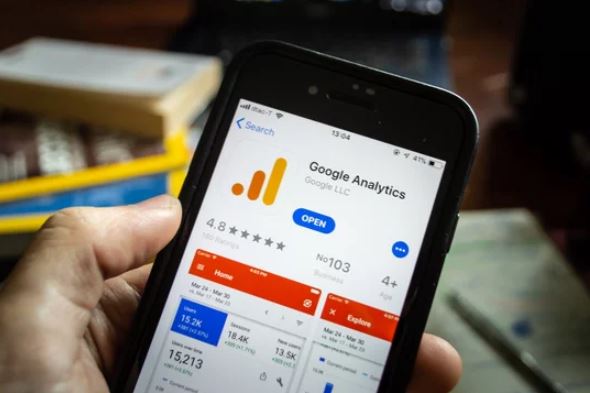Last Updated on
Embrace the Power of Google Analytics vs. Google Ads
Google has revolutionized digital marketing with its twin titans, Google Ads vs. Google Analytics. These powerful tools can propel your business to unprecedented heights when adequately harnessed. But the question lingers: how exactly do they differ, and how can they be used most effectively to fuel your online growth?
Unveiling the Magic of Google Analytics
Google Analytics is an extraordinary tool that gives businesses a bird’s-eye view of their online performance. Unlike a crystal ball, Google Analytics does not predict the future but serves as a treasure map, guiding companies to their digital pot of gold.

Dissecting the Benefits of Google Analytics
While the term ‘data analysis’ might conjure up images of bewildering spreadsheets and impenetrable walls of figures, Google Analytics is nothing short of a revelation for businesses of all sizes. Here’s why:
The Power of Audience Insights
One of the remarkable strengths of Google Analytics is its ability to provide deep insights into your audience. It helps you understand user behavior, demographics, interests, and more. Such information is essential in crafting a user-centric marketing strategy.
Tracking the User Journey
Google Analytics helps you to track the entire user journey, from the first click to the final conversion. This feature is invaluable as it allows businesses to understand the bottlenecks in the conversion process, empowering them to optimize their strategies accordingly.
Unveiling the Source of Traffic
Google Analytics breaks down the source of your traffic, showing you precisely where your visitors come from. Whether organic search, paid ads, social media, or referrals, you’ll have complete visibility, enabling you to invest in the most effective channels.
Exploring the Wonders of Google Ads
While Google Analytics tells you what’s happening, Google Ads is about making things happen. It’s a catalyst, a force multiplier for your business, enabling you to reach potential customers when they are ready to take action.
Breaking Down the Benefits of Google Ads
The appeal of Google Ads is multi-faceted. It’s a potent platform from reach to relevance, speed to scalability. Here’s why:
Expansive Reach
Google Ads gives your business unprecedented reach, putting your message in front of billions of users across the globe. With the right strategy, it can significantly expand your potential customer base.
Razor-Sharp Targeting
Through Google Ads, you can target potential customers based on demographics, location, interests, and even the type of device they’re using. This level of specificity ensures your ads reach the most relevant audience, increasing the likelihood of conversions.
Rapid Results
Google Ads is known for its ability to deliver rapid results. Unlike SEO, which requires time and patience, Google Ads can start driving traffic to your website almost immediately, providing a quick return on investment.
The Convergence of Google Analytics and Google Ads: A Synergistic Success
Understanding Google Analytics and Google Ads in isolation is beneficial, but their true power lies in their convergence. They offer a more holistic, complete view of your marketing efforts when used in conjunction.
Deeper Insights Through Integration
When Google Analytics and Google Ads are integrated, they allow businesses to track both ad performance and post-click activity, offering more profound insights into the effectiveness of their marketing efforts.
Optimizing for Success
With these combined insights, businesses can optimize their ad campaigns based on real-time data. This allows for more agile decision-making, leading to better campaign performance and a higher return on investment.
Attribution Modeling: The Key to Unveiling the Truth
Google Analytics helps to solve the attribution problem by assigning credit for a conversion to just one source. Businesses can more accurately determine which channels drive the most conversions, enabling them to invest their resources more effectively.
In Conclusion: Google Analytics vs. Google Ads – The Perfect Duo
Google Analytics and Google Ads are not opponents in a boxing ring but partners in a dance. While each tool is powerful on its own, when combined, they form a formidable duo that can unlock new opportunities for businesses in the digital realm.
Whether you’re an established brand or a startup, mastering these tools can significantly enhance your online presence, drive conversions, and boost your bottom line. So, embrace the power of Google’s twin titans and turbocharge your business to new heights.
FAQs
Do I need Google Analytics to use Google Ads?
No, you do not need Google Analytics to use Google Ads. Google Ads (formerly known as Google AdWords) is a separate advertising platform allowing you to create and manage online advertising campaigns to promote your products or services on Google’s search engine and advertising network.
Google Analytics and Google Ads are two distinct tools provided by Google, each serving different purposes:
- Google Ads: This platform is used for creating and running paid advertising campaigns on Google’s search engine (through Google Search Ads) and its advertising network, which includes websites, apps, and videos (through Google Display Ads and YouTube Ads). Google Ads helps you reach your target audience, increase visibility, and drive traffic to your website or landing pages.
- Google Analytics: On the other hand, Google Analytics is a web analytics service that provides insights into website traffic and user behavior. It helps you understand how users interact with your website, tracks conversions, measures website performance and provides data-driven insights for improving your website and marketing strategies.
While Google Ads and Google Analytics are independent tools, they can work together to provide a more comprehensive view of your advertising efforts and website performance:
- If you are running Google Ads campaigns to drive traffic to your website, integrating Google Analytics with your website can provide valuable data on user behavior, conversions, and the effectiveness of your advertising efforts.
- By linking your Google Ads account to Google Analytics, you can access additional data within Google Ads, such as bounce rates, time on site, and goal completions, which can help you optimize your advertising campaigns based on user engagement metrics.
In summary, while Google Analytics can complement and enhance your Google Ads campaigns, it is not a prerequisite for using Google Ads. You can use Google Ads independently to create and manage your online advertising campaigns without setting up or using Google Analytics.
Why Google Analytics and Google Ads are not matching?
Google Analytics and Google Ads may not always match perfectly for various reasons, even though Google owns both platforms. Here are some common factors that can cause discrepancies between the two:
- Tracking Mechanisms: Google Analytics and Google Ads use different tracking mechanisms. Google Analytics tracks user behavior on your website using a tracking code installed on your web pages. In contrast, Google Ads uses its tracking code to measure clicks and conversions from your ads. Discrepancies can occur if there are differences in how these tracking codes function or if the tracking codes are not implemented correctly.
- Attribution Models: Google Analytics and Google Ads may use different attribution models to assign credit for conversions. Google Analytics typically uses last-click attribution, which gives credit for modifications to the last interaction before the conversion. In contrast, Google Ads uses various attribution models, including last-click, first-click, linear, time decay, and more. Each platform’s conversions may be attributed differently depending on the attribution model.
- Data Processing Time: Google Analytics and Google Ads may have different data processing times. Google Analytics data is typically not real-time and may take some time to populate in the reports, whereas Google Ads data is more real-time. As a result, you may see temporary discrepancies in data when comparing the two platforms.
- Filtering and Settings: If filters or view settings are applied in Google Analytics or Google Ads, it can impact the data displayed in each platform, leading to differences.
- Cross-Domain Tracking: If your website uses cross-domain tracking, where users move between different domains during their visit, it can sometimes lead to discrepancies in data between Google Analytics and Google Ads.
- Excluded Data: If specific exclusions or filters are set up in either Google Analytics or Google Ads, it can affect the data reported in each platform.
- Bot and Invalid Clicks Detection: Google Ads has built-in mechanisms to detect and filter out invalid clicks and bot traffic. Such clicks are not included in Google Ads data but may still be in Google Analytics data.
- View Level Settings: The data in Google Analytics can be segmented using different views, and the settings in each view might differ, leading to differences in the data reported.
To minimize discrepancies and ensure data accuracy, it’s essential to verify that both Google Analytics and Google Ads are set up correctly and that their tracking codes are implemented accurately on your website. Additionally, understanding the differences in tracking and attribution models between the two platforms can help interpret the data correctly.




